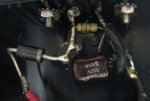Re: Looking for a DVA Genius
A better test would be to measure house voltage.
Just plug it into the wall socket. Convenient AC source signal.
That is a better test, but still not truly valid. Differences when using it on an engine will occur due to the fact that the house voltage is at 60HZ, but the engine is producing pulses, spikes, of very high rise and fall times, not a sine wave as is the case with house voltage. Well, let me clarify...the stator is outputting some kind of AC waveform that probably closely resembles the house current...but the PP is outputting to the coils high voltage pulses that have very fast rise and fall times. Probably does not resemble a sine wave at all. And, the frequency is constantly changing with engine RPM.
A GREAT test would be to put an oscilloscope on the input signal, read the peak DC voltage exactly, then measure with our homemade device and compare the 'scope with the device. That is the cadillac of the test to determine if it "works" or not. I really wish I had a scope so I could post real actual values here....
Not practical (for almost all of us) to use a scope....but if you use house voltage at least you are testing AC, verifying that the diode is actually rectifying, etc.
You know, this whole thing is kinda like when some ppl test batteries. They throw a voltmeter across the terminals, measure 12 volts, and think the batt is good. Maybe so, maybe not. A VALID battery test must include loading the battery to be absolutely sure.
My background? 20 years as a test engineer with IBM.
(I sure hope the above info is accurate...):redface:




















